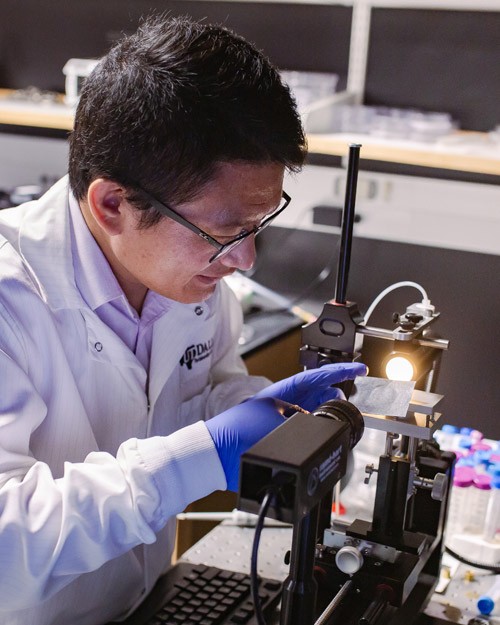
After only a few years as an independent investigator, a University of Texas at Dallas faculty member has earned national recognition for his nature-inspired research in water-harvesting and heat-transfer technology.
Dr. Xianming “Simon” Dai, assistant professor of mechanical engineering in the Erik Jonsson School of Engineering and Computer Science, recently earned the Outstanding Early Career Award at the 2021 micro Flow and Interfacial Phenomena Conference. The award recognizes an early-career researcher for outstanding and significant contributions to the fields of surface wettability, phase-change heat transfer and water harvesting.
Dai also recently received a five-year, $517,000 Faculty Early Career Development Program (CAREER) award from the National Science Foundation to support his heat transfer research. NSF CAREER grants are the agency’s most prestigious award for early-career faculty who exemplify the role of teacher-scholars and are likely to become leaders in their fields.
Dai, who joined UT Dallas in 2016, focuses on bioinspired research.
“Our strategy is to look at nature and see what nature does to address a similar challenge. Very often you can find that nature has a solution,” Dai said. “It may not be a direct solution, but if we discover science from nature, it can be more innovative.”

“Our strategy is to look at nature and see what nature does to address a similar challenge. Very often you can find that nature has a solution. It may not be a direct solution, but if we discover science from nature, it can be more innovative.”
Dr. Xianming “Simon” Dai, assistant professor of mechanical engineering in the Erik Jonsson School of Engineering and Computer Science
Dai credits his entire research group for these early-career awards. In their effort to develop a durable surface that can rapidly remove liquids from condensation, they have found inspiration from the movement of cilia, tiny hair-like spikes that push liquid out of the lungs.
The NSF CAREER grant supports his team’s future work in heat transfer. Surfaces, such as the coils of an air conditioner, become covered with droplets during condensation. Dai and his team are working on a durable quasi-liquid polymer surface with mobile spikes that can propel liquid in a mechanism like that of cilia. The thickness of the surface is just one-hundredth the diameter of a strand of human hair.
“The surface we are working to develop would make condensate slide off rapidly,” Dai said. The challenge has been to develop a durable coating so that droplets do not eventually wear it down.
Faster removal of water droplets clears the surface for more vapor to condense and is key to faster, more efficient cooling systems. The goal is to build smaller, lighter refrigeration and air-conditioning heat exchangers and thermal-management systems for a wide range of industries and applications.
About CAREER Awards
The Faculty Early Career Development Program supports early-career faculty who exemplify the role of teacher-scholars through outstanding research and excellent education. The highly selective program is the National Science Foundation’s most prestigious award for early-career faculty who are considered likely to become leaders in their fields.
Training future leaders in the field is an important part of the research process, Dai said, noting that in addition to research, the NSF CAREER grant supports educational and outreach activities. His lab includes student researchers from the undergraduate level to doctoral candidates.
Dai recruited one of the researchers in his Bioinspired Thermal Fluid lab through his UT Dallas class on heat transfer. Saiya Li, a mechanical engineering senior, said the exposure to research in Dai’s lab has opened new possibilities for her future.
“I did not think of this path until this year when I participated in Dr. Dai’s lab as an undergraduate researcher,” Li said. “Now, research is something that really interests me.”
In 2018 Dai’s research team engineered a surface that can capture water droplets from fog and vapor in the air and rapidly direct them into reservoirs formed by microgrooves. The surface was inspired by the way rice leaves and pitcher plants collect water.
Dai received an Army Research Office Young Investigator Award in 2019 to advance the technology. Earlier this year, the researchers discovered that the surface encourages tiny water droplets to move spontaneously into larger droplets, which is important for more efficient water harvesting.
